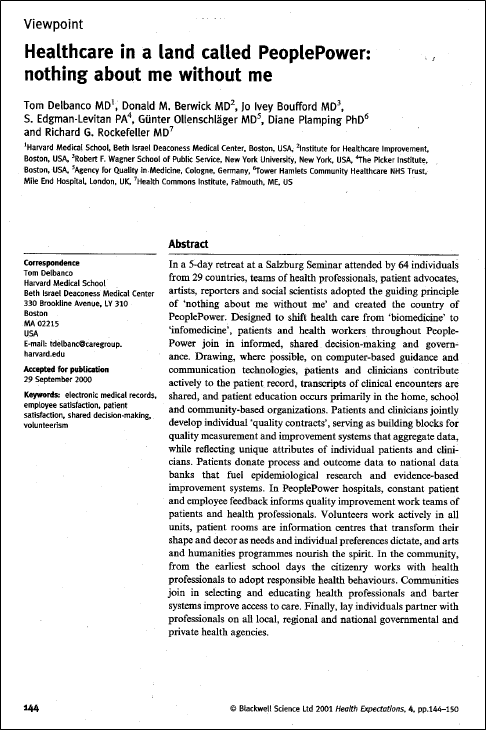 The first in a series about past papers that I think are important as we create the future of healthcare.
The first in a series about past papers that I think are important as we create the future of healthcare.
I’m preparing to participate next month in a seminar on shared decision making (SDM). SDM is the general issue of patients sharing actively in decisions about their care, as opposed to physicians and hospitals making the decision without asking.
The seminar’s full title is “The Greatest Untapped Resource in Healthcare? Informing and Involving Patients in Decisions about Their Medical Care.” The first phrase alludes to an expression made famous by Charlie Safran MD, of Beth Israel Deaconess, when he testified in 2004 to the House Ways & Means Committee’s subcommittee on health: “the most under-utilized resource in our information systems – the patient.” I recently learned it was first said years earlier by his colleague Warner Slack MD. Both of them were early mentors to Dr. Danny Sands, my primary physician.
Bluntly, these guys have been working for decades on empowering and enabling patients to be engaged in their care, and it’s a thrill to be connecting with them and moving the ball forward. I’ve met with all of them this year, and they shared copies of some of their writings. This is the first: “Healthcare in a Land Called PeoplePower: nothing about me without me.”
Published in 2001, this paper came out of the 1998 seminar. Its lead author is Tom Delbanco, organizer of the seminar, also of Beth Israel Deaconess. Second author was Don Berwick, founder of IHI (the Institute for Healthcare Improvement). (Click image to open PDF (413k).)
A few excerpts hint at why I invite you to read the paper.
- “Efforts to improve care might take strikingly different shape if patients worked as full partners with health professionals to design and implement change”
- “In [the mythical land of] PeoplePower, the Internet-based patient record exists as a single version that resides nowhere but is available everywhere. … Not only do patients have nearly complete access to their medical record, … they also write in it – elaborating, tracking …, correcting mistakes,… and at times suggesting both diagnoses and treatment plans.”
- “On People Power hospital floors, families help not only their loved ones, but also volunteer to aid many patients in the hospital…”
- “Primary care clinicians serve as ‘gateopeners’, in striking contrast to their former role as ‘gatekeepers.'”
- “In an effort to hold the media accountable, a national programme to inform and educate the media has established guidelines for fairness and accuracy. National and local agencies assist and support the media in recruiting and retaining experts skilled in interpreting research studies who teach reports to evaluate new findings critically.” …
Yes, this is a utopian vision. It says so, inside. I love it: it’s a vision worth shooting for.
We’ve made progress toward parts of it.This year’s seminar is organized by FIMDM, the Foundation for Informed Medical Decision Making. They’re the primary underwriters of Health News Review, about whom I’ve written often, which is a step toward the proposed media program. And today many care plans and providers do involve patients, more or less.
I think the paper is amazing, articulating this vision from a decade ago. (Wait’ll you see the really old stuff that’s in the drawer here. :–)) But first, I’d welcome your comments. What word should I carry to the seminar from the patient population?


[…] This post was mentioned on Twitter by Dave deBronkart and Marya Zilberberg, Inspire. Inspire said: New on site of @ePatientDave–landmark paper from 2001, "Healthcare in a Land Called PeoplePower" http://bit.ly/gOrHXX #epatient […]